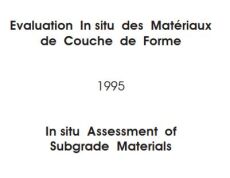Technical Reports Road pavements
This page lists technical reports of PIARC in the field of Road pavements. These publications are classified chronologically.
-
CD-7802 - Pavement Recycling (Guidelines)
This document, realised by the PIARC Technical Committee on Road Pavements (C7/8), is avaible only on CD-ROM. It contains three different guidelines: cold in place recycling of pavements with cement, cold in place recycling of pavements with bitumen emulsion or foamed bitumen, and hot mix asphalt recycling in plant. After a general introduction the three techniques will be discussed. This document is not intended as a specification document or to be a state of the art report. Its [...]
-
International Experiment to Harmonise Longitudinal and transverse Profile Measurement and Reporting Procedures
In 1998, the PIARC committee C1 on Surface Characteristics carried out a worldwide experiment to investigate the performance of different high speed profiling equipment. The design of the different pieces of equipment clearly reflects the policy of what is considered sufficient information (in the different countries) when measuring longitudinal and transverse profiles. The results of this PIARC experiment will therefore be a primary tool for road administrations around the world to pinpoint [...]
-
Recycling of Existing Flexible Pavements
The use of non-renewable resources, and the disposal of materials as waste, recycling of materials is an increasingly important consideration in meeting the overall objective of sustainable development. This objective, together with economic considerations, contribute to a political climate where the intention is to achieve a closed-cycle by recycling and reusing materials from existing pavements. The optimum situation is when the recycling can be justified economically. Until this is achieved, [...]
-
Choice of Materials and Design of Flexible Pavements for Severe Traffic and Climates
The rapid development of traffic, in particular commercial vehicles (CVs) within the last ten years, the development of the design of commercial vehicles and the variations in climate due to disturbances in the atmosphere have led to increased pavement damage. These changes have led to reviews of flexible pavements by several international research actions which have resulted in important conferences and publications. This report is based on a questionnaire sent to all member countries represented [...]
-
In Situ Assessment of Subgrade Materials

It is important to be able to forecast the performance of the subgrade, especially its acceptable limits of deformation derived for both the construction stage and during the working life of the pavement. Ten types of in situ test apparatus are described briefly and comparisons made between them, setting out their usefulness, field of application and limitations. Three studies comparing in situ tests are identified and described. The tests using large platens gave reasonably consistent results and [...]